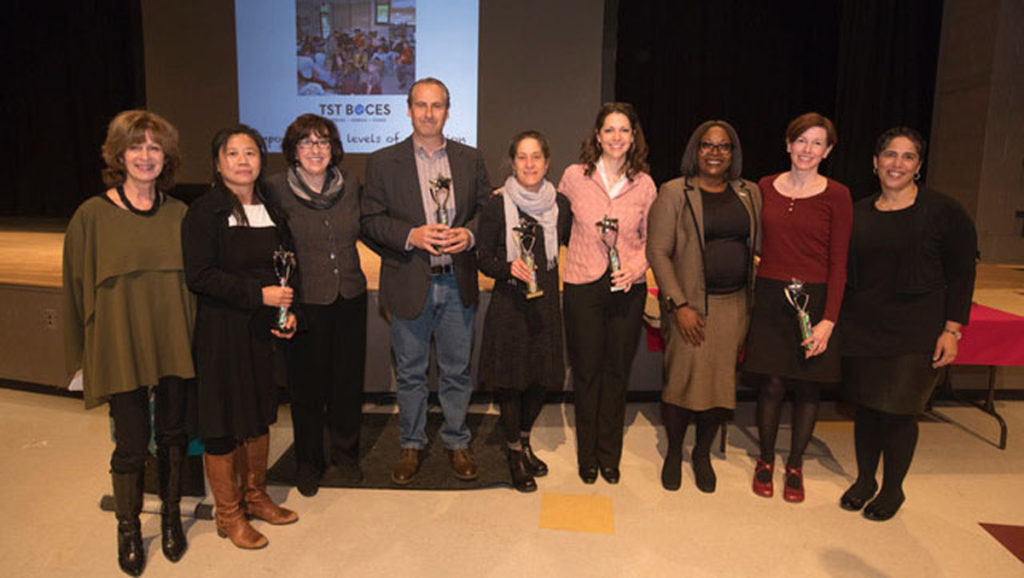Jeane Copenhaver-Johnson, associate professor and chair in the Department of Education, and local teacher Randi Beckmann were recently recognized at Cornell University’s Town-Gown Awards for facilitating the local Teacher Research Fellows Inquiry Group.
Opinion Editor Meaghan McElroy spoke to Copenhaver-Johnson about the award, the history of the program and what the future of the fellows program looks like.
This interview has been edited for length and clarity.
Meaghan McElroy: I saw that you were one of the co-designers for this research program. Why did you create this program?
Jeane Copenhaver-Johnson: In 2013–2014, first-grade teacher Randi Beckmann had a sabbatical from Ithaca City School District. Part of her purpose for her sabbatical was to learn more about teacher research and to try to start a teacher research community. When I came here from Ohio State in 2011, I had spent many years being parts of multiple teacher research communities back in Ohio, and I really missed it. … She and I ran a very small teacher research community that year just as part of her sabbatical research — to see if teachers would do it, what they would get out of it, what we would learn about it. At the end of that year, the Ithaca City School District opted not to make that a recurring practice. … Fortunately, the TST BOCES [Tompkins-Seneca-Tioga Board of Cooperative Educational Services], they coordinate many regional educational initiatives, and the TST-BOCES assistant superintendent said that he could think about how to get principals and superintendents from our local school districts to support sending one or two teachers per district to be part of the Teacher Research Fellows.
MM: What results do you see with the teachers that come through this program?
JCJ: We did a formal anonymous evaluation at the end of the last year from the teachers, but they also just talk and talk and talk about what it means to them. Among the things we found is that it helps the teachers find a voice, a professional voice. I think sometimes practicing teachers get pretty isolated in their classrooms, and you don’t always think that your learning is going to be valuable to someone else. … It normalizes the process of inquiry so that we don’t feel insecure to tell someone what we don’t know, because that can feel like a pretty scary thing for professionals to do.
MM: What exactly does teacher education research look like?
JCJ: For most teachers, it’s an extension of their normal practice. One of the things we tell teachers is that teacher inquiry shouldn’t mean that you’re going in and doing a bunch of stuff you wouldn’t be doing otherwise; it’s about doing the work you already do and doing it really well. … We ask all the Teacher Research Fellows to journal in relation to their question. So whatever that question happens to be, they make a small snippet of time to write about what they notice. Teachers’ lives are so full, and teachers’ days are so full. I go home, even in this form of teaching, and say, “Gosh, it’s a snowglobe, and it just won’t stop.” So for the research fellows, they have an opportunity to stop, let the snowglobe settle and write about what they saw before they forget and before the data gets cold. That gives them information about how to follow up the next day.
MM: I saw that the initiative won the Town-Gown Award. What was that experience like, to realize that your work was being recognized by the community?
JCJ: It was really nice. Randi and I have felt so appreciated by the teachers in the group, and we have loved being a part of that group, so we’re committed to doing it no matter what. But to know that someone else recognized that this is a way Ithaca College was contributing to the community was really nice for me because I just do it because I know it’s good.
MM: How do you think this benefits Ithaca College or the Ithaca community, to have the college working with local schools?
JCJ: It benefits the college because the teachers in the research fellows present their research here to our prospective teachers. We have graduate programs where the expectation is that our teacher candidates will research some feature of their own teaching practice and their teacher inquiry projects, and so that could feel like a pretty arbitrary master’s projects to students. Except when they see real teachers doing this work, they learn so much that it’s not just something you do — you graduate college and you go teach. You continue to learn and grow as a teacher all the time, and to see the models of those teachers come in and present what they’re learning is a nice way to reinforce that as a lifelong practice.
MM: What’s your hope for the future of the program?
JCJ: I think our hope is that, as we have more cohorts of Teacher Research Fellows come through, that eventually those research fellows will return back to their environments and share with the people who work with them and invite new research communities to grow up around the region. But that’s a little ways off.














